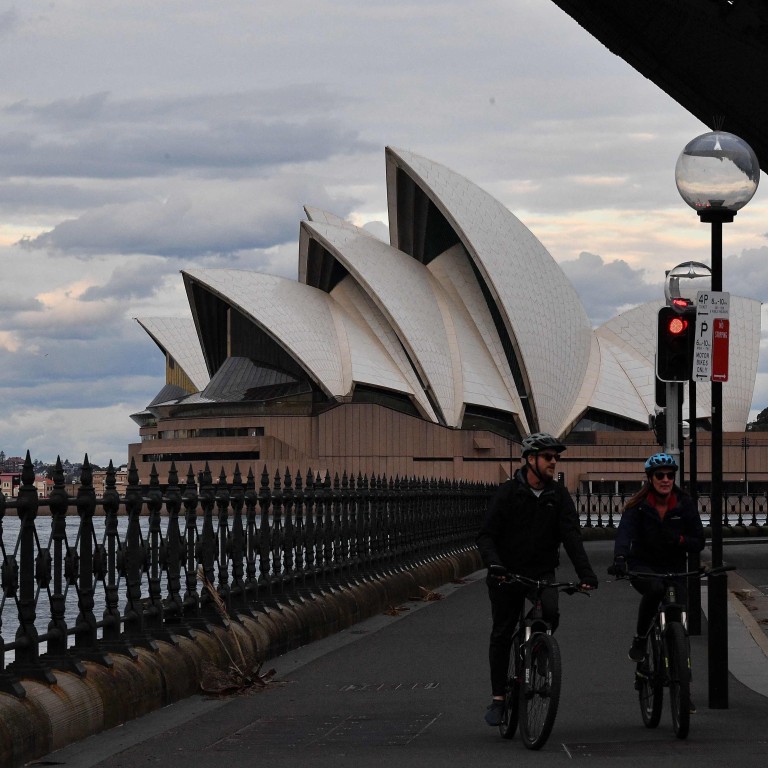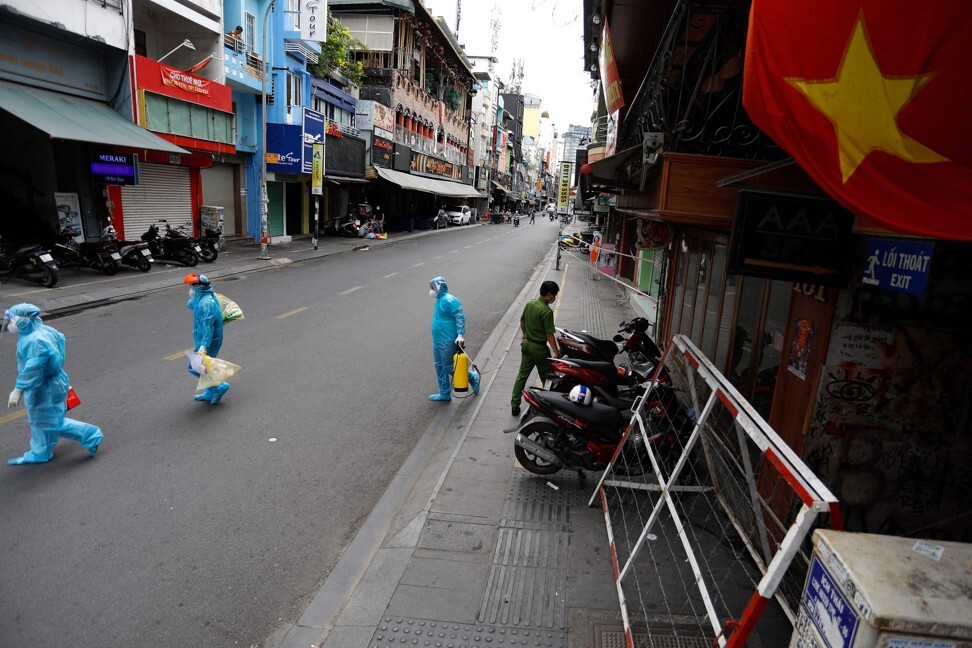
Has the Delta variant curbed the effectiveness of lockdowns in ‘zero coronavirus’ economies like Australia and Hong Kong?
- The infectiousness of the mutant coronavirus strain has led some experts to question whether elimination of the disease is no longer possible
- With more than half of Australia’s population in lockdown and cases surging in Vietnam, zero community transmission appears to be a difficult objective
The Delta variant is now challenging the effectiveness of that approach like never before, as outbreaks linked to the mutant strain in three state capitals have some experts deliberating whether elimination is no longer possible – even as more than half of the country’s 25 million people were under lockdown on Tuesday in a bid to curb its spread.
The chance that the variant, which was first identified in India, could be too infectious to wipe out has raised questions about the sustainability of “zero Covid” strategies across the Asia-Pacific.
Why are coronavirus vaccines – a success story in human innovation – viewed so negatively?
Believed to be about twice as transmissible as the original strain identified in Wuhan, China, the Delta variant has fuelled a surge in infections across the region, with countries including Indonesia, Malaysia and Thailand reporting record deaths.
The “zero Covid” club’s self-imposed isolation has also inflicted heavy social and economic costs, resulting in growing calls for clear road maps for the return of normal life, including international travel.
“It is no longer about when we choose to open our borders to the virus, but when we can no longer hold them,” said Catherine Bennett, a public health expert and epidemiologist at Deakin University in Melbourne. “We might yet get this under control, but must be prepared to have to keep serious restrictions in place to buy as much time as we can to allow all access to the vaccine.”

07:07
The global spread of the highly contagious Delta variant of Covid-19
On Tuesday, Australia’s second-largest city, Melbourne, and the surrounding state of Victoria extended a five-day “snap” lockdown – its fifth so far – by a week as officials recorded nine Covid-19 cases. In neighbouring South Australia, authorities announced a seven-day lockdown following the discovery of five cases linked to the mutant stain.
The restrictions came as Sydney and the state of New South Wales grappled with a major outbreak that has ballooned to more than 1,200 cases since mid-June, leading authorities to announce a lockdown that as yet has no end in sight.
Australian Medical Association president Dr Omar Khorshid on Tuesday told a local broadcaster that Sydney’s lockdown had not worked and indefinite restrictions could be needed until the population was fully vaccinated.
Coronavirus: Delta’s spread from London to Tokyo shows easing all restrictions after vaccination is ‘ill advised’
Khorshid said it would become clear in the coming days whether authorities would need to do “something really dramatic in order to stop the spread” or work out “the permanent settings” needed to protect people. Less than 12 per cent of Australia’s 25 million people have been fully vaccinated.
Health minister Greg Hunt on Tuesday said he believed the New South Wales outbreak had stabilised and was a “sign of hope” after authorities reported 78 new cases, down from 98 the previous day.
Earlier this week, Victoria’s chief health officer Brett Sutton said the state had to lock down to give itself the “best chance” as there was “no absolute guarantee that we can win” against the Delta variant.
In Vietnam, surging cases in Ho Chi Minh City – the epicentre of the country’s outbreak – have raised questions about the effectiveness of the strict lockdown implemented there nearly a fortnight ago.
After keeping cases close to zero for most of the pandemic, the Southeast Asian country has reported nearly 50,000 infections since April. Like other lower-income countries in the region, Vietnam has struggled to secure adequate vaccine supplies and has so far fully inoculated less than 5 per cent of its 96 million people.
Barney Flower, an infectious disease doctor at the Oxford University Clinical Research Unit in Ho Chi Minh City, said it was conceivable that getting back to zero could be impossible once the Delta variant had taken hold.
“This means that non-pharmaceutical interventions that worked previously to bring numbers under control are taking longer to slow down outbreaks and may not be sufficient to eliminate community transmission entirely,” he said. “That means once restrictions are relaxed, cases will increase exponentially again.”
How can Australia, New Zealand, and Hong Kong return to pre-pandemic life? Vaccines, timetables, and targets
Alexandra Martiniuk, an epidemiologist at the University of Sydney School of Public Health, said although lockdowns remained an “extremely useful tool” to bring down cases, it remained unclear whether they could eliminate the variant.
“Is getting back to zero possible? Only time will tell,” she said. “I don’t think we have many global examples of Delta transmitting, in a mostly unvaccinated population, at the rate of 100-plus new infections a day, and then using lockdowns to return back to zero community transmission.”
Martiniuk said it was already clear the variant was too infectious for the “old techniques of test, trace, isolate” that New South Wales authorities had relied on before the latest lockdown.
But some experts – such as Michael Baker, a professor of public health at the University of Otago in Wellington, New Zealand – believe elimination remains a realistic goal despite the Delta variant’s contagiousness.
“It is still the same virus, and is transmitted in the same way,” he said. “Outbreaks caused by this variant have been eliminated in Australia, and I think they could be in New Zealand as well. They will just take greater effort at every point in the control pathway, including border quarantine, early outbreak detection, rapid contact tracing, and lockdowns if these are needed.”
Siddharth Sridhar, a clinical virologist at Hong Kong University, said the “zero Covid” approach should be seen as a means to an end, instead of an actual goal.
“A ‘zero Covid’ philosophy means we take Covid-19 as a serious threat to our health care systems and do everything we can to prevent cases from happening in the first place, until such time as a substantial portion of the community is vaccinated,” he said, adding that while the Delta variant gave authorities “less time to react”, decisive early action could at least reduce, if not eliminate, transmission.
As Delta variant sweeps the West, Asia faces a choice: stick to ‘zero-Covid’ approach or learn to live with it
“When a substantial portion of the community is vaccinated, you may still have plenty of Covid-19 cases, but most of them would not require hospitalisation. At this point, ‘zero Covid’ has to be abandoned as it is no longer required or sustainable.”
Flower, the Oxford University Clinical Research Unit specialist, said he believed “zero Covid” economies would choose elimination if they had the choice again, as the approach had saved tens of thousands of lives. But he said authorities would also face difficult choices around reopening if it became clear zero cases was no longer an attainable goal.
“The vaccine challenge is greater in ‘zero Covid’ countries, by virtue of their being no natural immunity,” he said.
“One thing we can say for sure is that vaccine roll out is increasing exponentially now, and early signs of their effects in other countries are very encouraging. Upon reopening we need to accept there will, inevitably, be Covid-19 deaths, it’s just a question of how many and to what extent it overwhelms the health system.”



